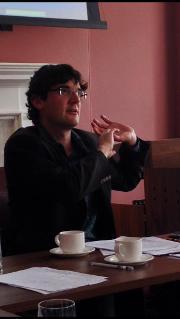In this guest post, members of No Tech for Tyrants (NT4T) – a student-led, UK-based organisation working to sever the links between higher education, violent technology, and hostile immigration environments – discuss one important arm of their work.

Photo by Cory Doctorow on Flickr, licenced by CC BY-SA 2.0
Migrant communities are endangered by universities’ relationships with businesses like Palantir Technologies, whose software is “mission critical” to US Immigration and Customs Enforcement’s (ICE) mass raids, detentions, and deportations. The harm inflicted by ICE is an integral component of a white nationalist deportation machine, which routinely destroys lives and condemns migrants to deadly concentration camps. Migrant rights organisations describe Palantir as the “most prominent supporter of the deportation machine in Silicon Valley.” The anti-migrant violence Palantir enables would not be possible without the talent it recruits from top UK universities. In exchange for material benefits, universities invite Palantir representatives to deliver talks, present at career fairs, and sponsor student prizes. Several groups have cut ties with Palantir, citing the company’s facilitation of anti-migrant violence; yet, despite claiming to be committed to social responsibility, many universities remain open to Palantir.
As members of No Tech For Tyrants (NT4T), a student-led migrant justice organisation, we met with university administrators to request that they implement ethical guidelines in regards to their corporate partnerships. Administrators responded with two kinds of objections: ethical guidelines would (1) threaten free expression, and (2) be too political. We’ll explicate and reject both kinds of objection. Instituting ethical guidelines on corporate partnerships is necessary for dismantling the relationship between universities and technology businesses that facilitate egregious harm. (more…)









